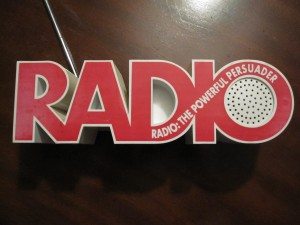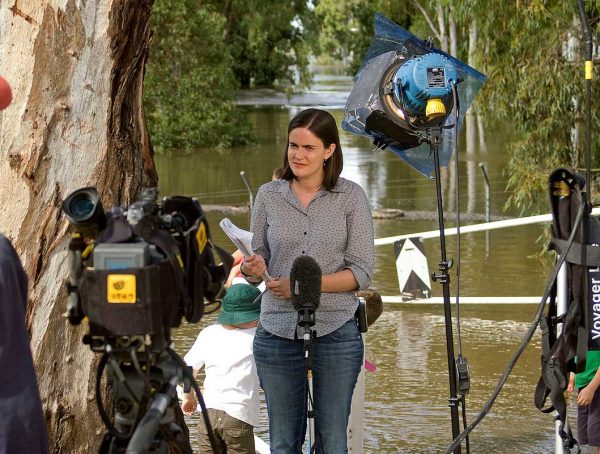 Travel the country as I often do and you won’t find much local news on the radio. Consolidation has just about killed it. As a result, big city all-news radio stations and networks have lost their farm systems. “We don’t have the minor league teams to draw on that we used to,” says Harvey Nagler, vice president of CBS Radio News. But there’s one major exception: NPR.
Travel the country as I often do and you won’t find much local news on the radio. Consolidation has just about killed it. As a result, big city all-news radio stations and networks have lost their farm systems. “We don’t have the minor league teams to draw on that we used to,” says Harvey Nagler, vice president of CBS Radio News. But there’s one major exception: NPR.
In an effort to spread its brand, NPR recently decided to stop calling itself National Public Radio but radio is still its heart and soul. And with 780 member stations, NPR has an impressive farm system, and often calls up some of the best to the big leagues. Reporters like Tamara Keith and Jason Beaubien, for example, got their start at local public radio stations.
NPR’s long-form programs “Morning Edition” and “All Things Considered,” feature radio storytelling at its best. The writing is crisp and evocative, and the stories make great use of natural sound, which NPR executive Robert Garcia calls “the currency of the realm.”
“It’s what brings people into a story,” Garcia says. “If somebody’s in a Pakistani village you’re going to be listening to [it]. You can practically taste the dust on the road.”
As a regular listener to NPR, it’s always seemed to me that the hourly newscasts just didn’t measure up to the same standards as the programs. The writing was flat, most correspondent reports were straight voicers, many of the sound bites were from phoners of marginal quality and there was almost no use of natural sound. Garcia’s been working to change that.
Now, some 50-second stories include multiple sound bites and nat sound. Instead of filing a report, a correspondents may discuss a story in a Q-and-A format with the anchor, which can run longer. The newscasts also are trying to respond faster to breaking news, something they were notoriously slow about in the past.
“We are getting much better at that out of necessity,” Garcia says, “and I think that’s because more people are turning to National Public Radio as their primary source of information. So it’s incumbent on us to move more quickly.”
About time, I’d say. Because the truth is, I care about radio news. I spent a lot of my early career in radio and it was a great place to start. CBS’s Nagler says it still is. A lot of the best writers in the business, he says, come out of radio, “because you need to think on your feet and write concisely.” There may not be as many places to learn that as there used to be but it’s good to know there are still a few.









6 Comments
In nearly all towns that Ive visited over the last couple of years, ( and I travel a lot!) …NPR was about the only local news program unless you count the local “all sports talk” on AM. Keep up the good work NPR!
Sorry Deborah, not buying “the end” story. True, radio doesn’t do news as it did 20, 15, 10 years ago — but “won’t find much local news on the radio” is just a tad bit lazy. When next in Ohio, give me a call and we’ll go for a drive through little towns that still do, medium cities that still do and big cities that still do — public and commercial. It isn’t easy, but “just about killed” is like saying the newspaper industry is dead.
Check out places like Mitchell, SD; Dover, OH; Marshfield, MA; even Akron, OH. Listen to Lorain, OH where the news director there still does a hell of job despite going part-time, or the folks in Youngstown who still talk, inform and squeeze out an occasional story on their own (sarcasm directed not at them); look at what Michigan Radio does in Ann Arbor, or have the traditional news flamethrowers in the big cities (WTOP, KYW, WCBS, WINS, WBBM, KCBS, KNX, KIRO, etc.) turning out the lights at 6? Even the ever-popular whipping boy for those singing the consolidation blues, Clear Channel, provide news for their communities — as well as places to talk about it.
That’s like says television news is dead because CNN just talks about it. “The Situation Room” still packs a hell of a lot of news in all that talk, don’t they? Last time I checked, changing times haven’t killed print — but it is forcing them to change. Same with TV. Same with radio. Same with the web. We spend way too much time bemoaning the way things aren’t the way they used to be.
Here’s what’s really changed: the public, our neighbors, our communities, our customers — have decided they want their news in different ways. It’s not just about what pops out of a speaker or a picture tube or leaps off a piece of paper anymore. The challenge for broadcasters and publishers and citizen journalists isn’t how to do reporting and journalism, it’s how to make money to afford doing so. The model of communities wanting to know what’s going on in their backyard hasn’t changed, the method of satisfying that need has evolved and we haven’t figured out yet the business model is what’s broken.
Would be nice to spend more time of fixing that and building new sales and marketing approaches rather than decrying the end of the world that isn’t really the end.
And a note to my friends at the network: want to really start rebuilding the farm system? Leave New York, Washington and Atlanta and take a drive with the radio on. Be prepared to listen, and you’d better have a good pitch on why the people working for us should consider changing their quality of life to meet your needs. Recruit the bench; that’s changed, too. They aren’t standing in line anymore begging for the “big” jobs because the new crop has figured out 24/7 is something they expect a convenience store to offer, not a career. That’s another model you need to change.